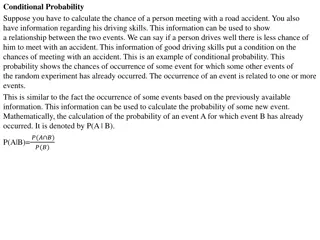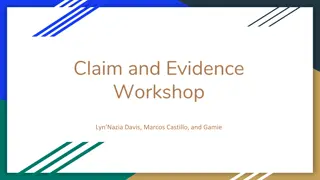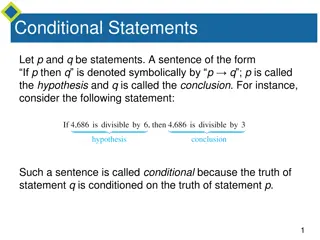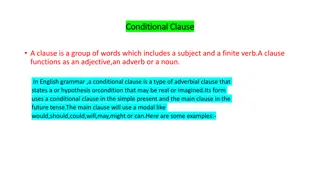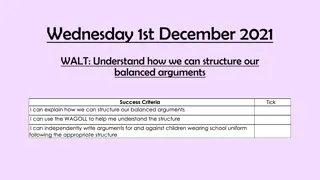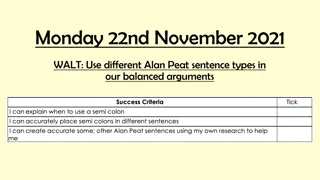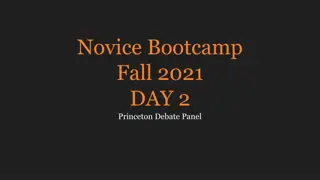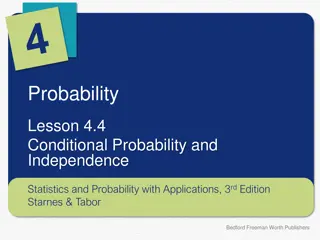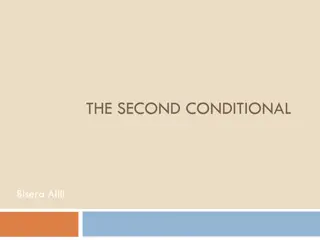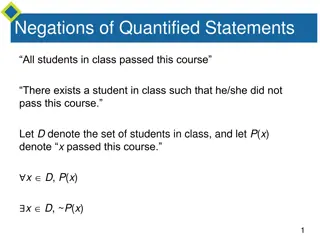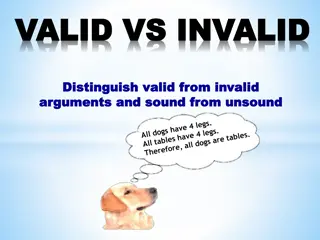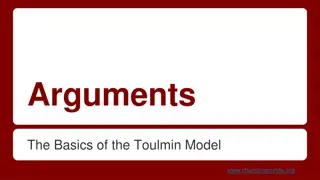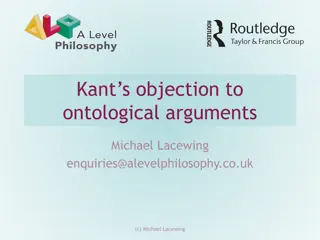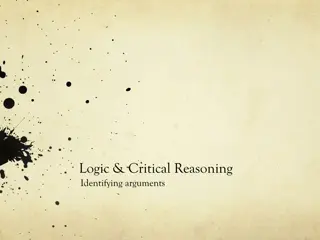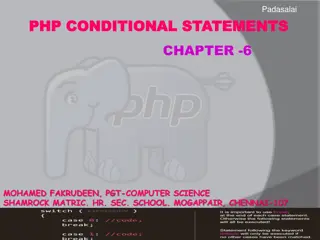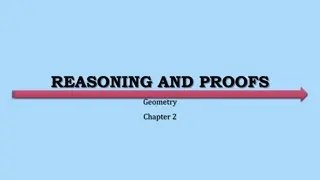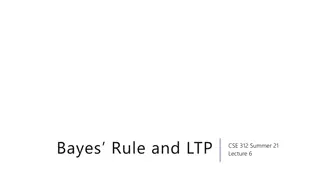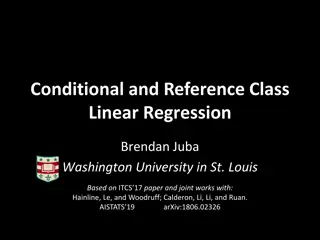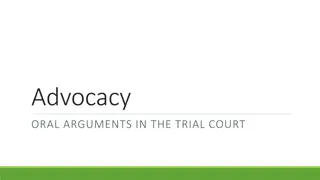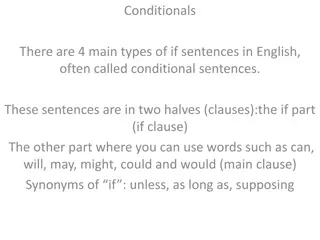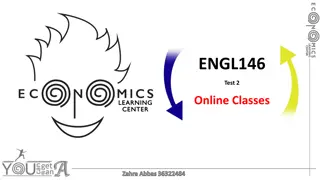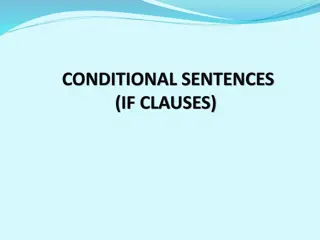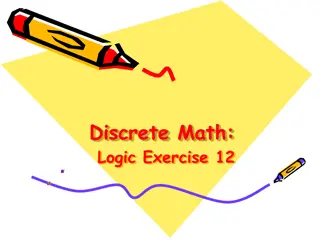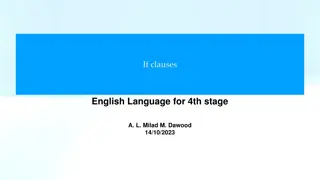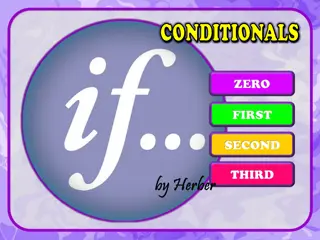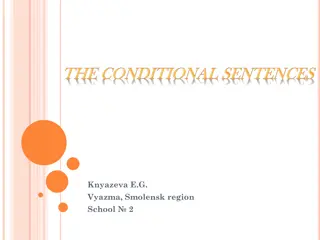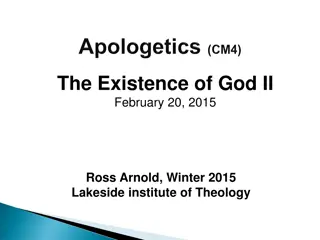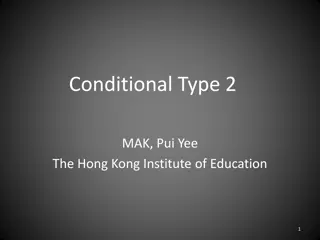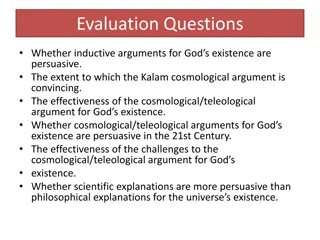Understanding Logical Form and Equivalence in Conditional Statements
Delve into the intricacies of logical form, equivalence, and compound statements in the realm of propositional logic. Explore valid and invalid arguments, conditional statements, and the logic of compound statements with puzzles to sharpen your logical reasoning skills. Unravel scenarios like determ
2 views • 81 slides
Understanding Conditional Probability and Bayes Theorem
Conditional probability relates the likelihood of an event to the occurrence of another event. Theorems such as the Multiplication Theorem and Bayes Theorem provide a framework to calculate probabilities based on prior information. Conditional probability is used to analyze scenarios like the relati
1 views • 5 slides
Mastering the Toulmin Method for Constructing Persuasive Arguments
Learn how to effectively structure arguments using the Toulmin Method, which consists of Claim, Data, Warrant, Backing, Counterclaim, and Rebuttal elements. Explore reasoning and logic concepts, differentiate between inductive and deductive reasoning, and understand how to construct valid arguments
0 views • 30 slides
Understanding Conditional Statements in Logic
Conditional statements in logic involve connecting statements with an "if-then" structure. The truth of the conclusion is dependent on the truth of the hypothesis. Explore examples, truth tables, and logical equivalences to grasp the concepts of conditional statements.
0 views • 26 slides
Understanding Conditional Clauses in English Grammar
A conditional clause is a type of adverbial clause in English grammar that states a hypothesis or condition using a conditional clause in the simple present and the main clause in the future tense. This type of clause uses modal verbs like would, should, could, will, may, might, or can. Conditional
2 views • 6 slides
Understanding the Structure of Balanced Arguments
Explore the concept of using the third person in writing balanced arguments to maintain objectivity and structure. Learn about third person pronouns and the importance of being unbiased in your writing. Understand the significance of structuring your arguments and maintaining a clear order for effec
0 views • 11 slides
Mastering Alan Peat's Balanced Arguments with Different Sentence Types
Explore the use of various Alan Peat sentence types in crafting balanced arguments, focusing on incorporating semi-colons effectively. Engage in interactive activities and practice sessions to enhance your skills in creating compelling arguments. Dive into examples and exercises to refine your under
1 views • 12 slides
Mastering Debate: Essential Strategies and Techniques
Learn key concepts like argument structure, points of clarification, and how to make compelling arguments in a debate setting. Discover the importance of warrants, impacts, and implications in formulating strong arguments. Explore tips on coming up with effective arguments and understanding differen
0 views • 47 slides
Mastering Final Focus in Debates
Final Focus, a crucial 2-minute speech at the end of a debate, serves as your last chance to persuade the judge of your victory. It involves comparing key voters and emphasizing the impact of your arguments. Weighing key voters is essential, with a focus on demonstrating why the scale tips in your f
1 views • 4 slides
Understanding Conditional Probability and Independence in Statistics
Conditional probability and independence are essential concepts in statistics. This lesson covers how to find and interpret conditional probabilities using two-way tables, calculate probabilities using the conditional probability formula, and determine the independence of events. Through examples li
0 views • 15 slides
Understanding the Second Conditional in English Grammar
The second conditional in English grammar is used to talk about unlikely or impossible situations in the present or future. It involves using 'if' followed by the past simple, 'would', and the infinitive. This type of conditional is different from the first conditional as it deals with less likely s
0 views • 10 slides
Understanding Negations in Quantified and Conditional Statements
Explore the concept of negations in quantified statements, where the negation of a universal statement equates to an existential statement, and vice versa. Discover the importance of negations in universal conditional statements and their relationship to logical equivalence. Dive into examples of ne
0 views • 15 slides
Understanding Reasonable Arguments vs. Pseudo-Arguments
The provided content focuses on distinguishing between reasonable arguments and pseudo-arguments through thought-provoking questions such as the ethical treatment of animals, city subsidies for sports venues, and subjective opinions on aesthetics. It also explains the structure of an argument, highl
0 views • 18 slides
Exploring Unusual Activities and Second Conditional Grammar
Delve into the realm of unusual activities and learn about the second conditional grammar in this engaging study. Discover vocabulary related to hypnotism, hair dyeing, and tarantulas. Explore how the second conditional is used to discuss improbable future scenarios and present impossibilities. Unde
1 views • 9 slides
Understanding Valid and Invalid Arguments in Logic
In logic, arguments consist of premises supporting a conclusion, with deductive arguments claiming logical necessity. Valid arguments have premises implying the conclusion, making them deductively valid. For example, if all actors are robots and Tom Cruise is an actor, then logically Tom Cruise must
0 views • 25 slides
An Examination of Ontological Arguments for God's Necessary Existence
Various ontological arguments, such as Malcolm's and Anselm's, propose that the existence of God is logically necessary, grounded in the concept of God as the greatest possible being. These arguments challenge the coherence of the concept of God and counter objections, like Kant's claim that existen
2 views • 10 slides
Understanding the Toulmin Model for Effective Argumentation
The Toulmin Model provides a structured approach to crafting and evaluating arguments, consisting of key components like claims, grounds/data, and warrants. It emphasizes the importance of using evidence and reasoning to support claims effectively. By understanding this model, one can enhance the pe
0 views • 13 slides
Kant's Critique of Ontological Arguments
An exploration of Kant's objection to ontological arguments, examining the flaws in the reasoning of Anselm and Descartes. Kant argues that existence is not a predicate and does not enhance the concept of a being. Therefore, ontological arguments cannot prove the existence of God solely through conc
0 views • 7 slides
Understanding Logic and Critical Reasoning: Identifying Arguments
In the study of logic and critical reasoning, identifying arguments is a fundamental task. Arguments consist of premises supporting a conclusion, and they can be identified by specific indicators and techniques. Understanding argument structure and types of support, such as deductive and inductive,
2 views • 15 slides
Understanding PHP Conditional Statements for Decision Making Logics
Conditional statements in PHP are essential for decision-making logics, allowing the execution of specific code blocks based on defined conditions. This article covers different types of conditional statements like if, if-else, if-elseif-else, and switch in PHP, along with syntax examples and their
0 views • 17 slides
Understanding Conditional Statements in Geometry
In this chapter of "Big Ideas Geometry," the focus is on conditional statements in geometry. Learn how to write conditional and biconditional statements, determine if statements are true or false, and explore logical implications such as converse and negation. Through examples and explanations, gras
0 views • 54 slides
Understanding Bayes Rule and Conditional Probability
Dive into the concept of Bayes Rule and conditional probability through a practical example involving Wonka Bars and a precise scale. Explore how conditional probabilities play a crucial role in determining the likelihood of certain events. Gain insights on reversing conditioning and applying Bayes
0 views • 35 slides
Conditional and Reference Class Linear Regression: A Comprehensive Overview
In this comprehensive presentation, the concept of conditional and reference class linear regression is explored in depth, elucidating key aspects such as determining relevant data for inference, solving for k-DNF conditions on Boolean and real attributes, and developing algorithms for conditional l
0 views • 33 slides
Guide to Oral Arguments in Trial Court
Learn how to conduct oral arguments in a trial court, including the steps for both the movant and respondent, strategies for making strong arguments, and tips for responding effectively. This comprehensive guide covers the dos and don'ts of oral arguments, emphasizing the importance of preparation,
0 views • 9 slides
Supporters of Slavery in the 19th Century: Legal, Religious, and Economic Arguments
In the 19th century, defenders of slavery utilized legal arguments by denying citizenship rights to blacks, religious arguments by justifying ownership and guidance through biblical references, and economic arguments by comparing treatment of slaves in the South to conditions of workers in the North
0 views • 4 slides
Understanding IF Conditionals in English Grammar
IF conditionals in English grammar introduce different kinds of conditions that may or may not happen, including the zero conditional, first conditional, second conditional, and third conditional. These conditionals are expressed through IF clauses followed by main clauses, each serving a specific p
0 views • 16 slides
Understanding the 4 Main Types of Conditional Sentences in English
Conditional sentences in English consist of two parts: the "if" clause and the main clause. There are four main types of conditional sentences - Zero Conditional, First Conditional, Second Conditional, and Third Conditional. Each type is used to express different conditions and outcomes based on cer
1 views • 16 slides
Understanding Conditional Sentences and Time Clauses
Conditional sentences are divided into real and unreal scenarios. Real conditionals, like zero and first conditionals, express present or future possibilities, while unreal conditionals, such as second and third conditionals, discuss imaginary or impossible situations. The use of "if" indicates less
0 views • 32 slides
English Grammar Practice: Conditional Sentences Type 3
Practice English grammar with a focus on conditional sentences type 3. The content includes examples and exercises to help improve understanding and usage of past perfect tense, conditionals, and past participle forms. Explore scenarios and complete sentences to enhance your skills in forming comple
0 views • 14 slides
Understanding Conditional Sentences (If Clauses) in English Grammar
This content provides insights into conditional sentences (if clauses) in English grammar, focusing on the First Conditional for talking about possible future events or situations. It explains the structure, usage, and examples of First Conditional sentences in different contexts such as predictions
0 views • 7 slides
Conditional Statements in Discrete Math: Logic Exercise Solutions
Practice writing conditional statements in English for various scenarios such as weather conditions, achievements, requirements, and guarantees. Understand the antecedent and consequent relationship in logic exercises. Common ways to express conditional statements explained with examples.
0 views • 5 slides
Understanding If Clauses in English Grammar
If clauses are a vital aspect of English grammar, serving to express conditions that must be met for specific outcomes. They come in four types, including the zero conditional for facts, the second conditional for unlikely situations, and the third conditional for past hypothetical scenarios. While
0 views • 28 slides
English Conditional Sentences Practice Examples with Images
Explore a collection of English conditional sentences practice examples with accompanying images. From zero conditional to third conditional, learn how to construct sentences using different tenses and structures. Enhance your understanding of if-clauses and main clauses through these visual aids.
0 views • 21 slides
Understanding First Conditional Sentences with Examples
Learn about first conditional sentences in English grammar, how to form them using "if" and "will", and practice with various examples. Understand the usage of first conditional for future actions dependent on fulfilling certain conditions. Improve your understanding through examples and exercises p
0 views • 10 slides
First Conditional: Understanding and Examples
Explore the First Conditional tense with examples and practice exercises. Understand how to form conditional sentences with "if" clauses and main clauses. See how actions in the future depend on fulfilling certain conditions, illustrated through clear examples and explanations.
0 views • 10 slides
Understanding Conditional Sentences: Types and Usage Explained
Conditional sentences are complex sentences with a subordinate clause of condition, usually starting with "IF". Learn about zero, first, second, third, and mixed conditional sentences, their structures, and examples to enhance your understanding and usage of different types of conditionals.
0 views • 13 slides
Philosophical Apologetics: Arguments for the Existence of God
Philosophical apologetics presents various arguments for the existence of God, including the ontological, cosmological, teleological, moral, transcendental, and presuppositional arguments. These arguments cover diverse aspects such as change, causality, design, contingency, miracles, consciousness,
0 views • 10 slides
Conditional Type 2 - If I Had a Million Dollars Revision
Learn about the second conditional type and practice forming conditional sentences using "If I had a million dollars" scenario. Understand the usage of the 1st conditional for discussing possible future situations and explore the consequences of hypothetical scenarios like having a bird on your head
0 views • 22 slides
Evaluating Arguments for God's Existence in the 21st Century
Exploring the persuasiveness of inductive arguments for God's existence, assessing the Kalam cosmological argument, and evaluating the effectiveness of cosmological/teleological arguments. Delving into whether scientific explanations surpass philosophical ones, the strengths and weaknesses of these
0 views • 16 slides
Understanding Conditional Discharge in Mental Health: A Comprehensive Guide
Explore the complexities of conditional discharge in mental health, from its definition to planning for discharge and post-discharge care. Learn about conditions, frameworks, and recall procedures associated with this critical process. Delve deeper into the nuanced aspects of managing risks and prot
0 views • 31 slides

